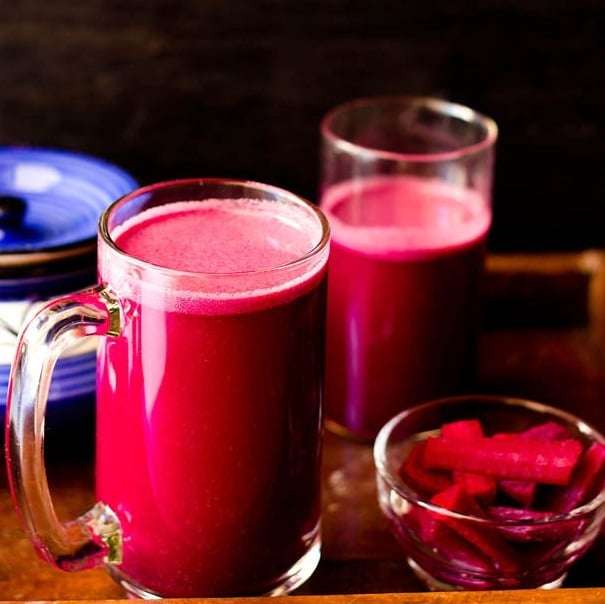
4.9 from 93 votes
Kanji Recipe
Learn to make Kanji that is a traditional North Indian fermented drink. This healthy probiotic drink is traditionally made with black carrots. But with all the health benefits, my easy recipe is made with regular red carrots and beets.
Prep Time
15 mins
Total Time
15 mins
Servings: 8
Calories: 40 kcal
Course:
Drinks
Cuisine:
Indian
Ingredients
- 5 to 6 carrots - medium-sized
- 2 beetroots - small-sized
- 8 cups water - approx 2 litres of water, boiled
- 2 teaspoons red chili powder or cayenne pepper - add as needed
- 2 tablespoons yellow mustard seeds or 1 tablespoon black mustard seeds
- 1 tablespoon black salt or regular salt or pink salt, add as needed
Instructions
- Rinse and then peel the carrots and beetroots.
- Note that you can use orange carrots, if you do not have red carrots. If you are not a fan or beets, skip them and swap with 1 more medium-sized carrot.
- Chop into 1.5 to 2 inches long sticks or batons.
- First boil water and let it cool at room temperature. Cover the pan when the water cools.
- In a clean ceramic or glass jars with a wide mouth, add the carrots, beets, ground yellow mustard powder, black salt, pink salt or regular salt and red chili powder or cayenne.
- Mix all the ingredients with a clean dry spoon.
- Cover with loosely with a lid or secure and tie a muslin cloth/cheese cloth on the top of the jar or bottle. Keep the jars in the sun for 2 to 3 days or up-to 4 to 5 days depending on the sunlight in your area.
- For an intense and strong sunlight, about 1 to 2 days is good enough for fermentation. When there are cloudy days and less sunlight, 4 to 5 days will work. But do ensure that your kanji drink is fermented well. Do not keep so long that will make your drink over fermented.
- Stir with a wooden spoon or shake the jar everyday.
- When the kanji tastes sour, it means the drink is fermented.
- Serve carrot kanji straightway or refrigerate. It stays good in the fridge for about 4 to 5 days.
- You could add a few ice cubes while serving or refrigerate to make it cold before serving.
- Drink the kanji before meals or anytime during the day. Serve the fermented carrot and beets sticks as a pickle condiment with any Indian main course.
- The sour-tangy carrots and beets can be included in a salad or add as toppings to your wraps, burgers or sandwiches.
Cup of Yum
Notes
- Soak ½ cup urad dal(husked black gram) in water overnight or for 6 to 8 hours. Drain the extra water. Rinse the soaked lentils a few times draining all the water.
- In a blender or grinder, grind the urad dal with 1 green chili, ½ tsp cumin, a pinch of asafoetida, 1 inch ginger and salt with very less water to a thick flowing batter.
- Heat oil for deep frying in a pan or kadai (wok). Gently place spoonfuls of the the batter into medium hot oil. Fry the vada until they are golden and crisp. Drain on kitchen paper towels for a few minutes
- Then soak the fried vadas in water for 12-15 minutes. Gently press the soaked vada between the palms of your hands to squeeze out the extra water.
- Soak these vadas in the kanji for a few hours or overnight in the refrigerator. Serve kanji vada cold or chilled.
Nutrition Information
Calories
40kcal
(2%)
Carbohydrates
7g
(2%)
Protein
1g
(2%)
Fat
1g
(2%)
Saturated Fat
1g
(5%)
Sodium
935mg
(39%)
Potassium
219mg
(6%)
Fiber
2g
(8%)
Sugar
3g
(6%)
Vitamin A
6525IU
(131%)
Vitamin B1 (Thiamine)
1mg
Vitamin B2 (Riboflavin)
1mg
Vitamin B3 (Niacin)
1mg
Vitamin B6
1mg
Vitamin C
3mg
(3%)
Vitamin E
1mg
Vitamin K
6µg
Calcium
32mg
(3%)
Vitamin B9 (Folate)
34µg
Iron
1mg
(6%)
Magnesium
23mg
Phosphorus
46mg
Zinc
1mg
Nutrition Facts
Serving: 8Serving
Amount Per Serving
Calories 40
% Daily Value*
| Calories | 40kcal | 2% |
| Carbohydrates | 7g | 2% |
| Protein | 1g | 2% |
| Fat | 1g | 2% |
| Saturated Fat | 1g | 5% |
| Sodium | 935mg | 39% |
| Potassium | 219mg | 5% |
| Fiber | 2g | 8% |
| Sugar | 3g | 6% |
| Vitamin A | 6525IU | 131% |
| Vitamin B1 (Thiamine) | 1mg | |
| Vitamin B2 (Riboflavin) | 1mg | |
| Vitamin B3 (Niacin) | 1mg | |
| Vitamin B6 | 1mg | |
| Vitamin C | 3mg | 3% |
| Vitamin E | 1mg | |
| Vitamin K | 6µg | |
| Calcium | 32mg | 3% |
| Vitamin B9 (Folate) | 34µg | |
| Iron | 1mg | 6% |
| Magnesium | 23mg | 6% |
| Phosphorus | 46mg | |
| Zinc | 1mg |
* Percent Daily Values are based on a 2,000 calorie diet.